Our future is in research: a brand new research building, several launching projects and ongoing strategic programmes at the Academy
A brand new research building, two multi-billion-forint property investments, evolving strategic programmes – in essence this is what 2017 has in store for the Hungarian Academy of Sciences. During a press conference held in the newly delivered Research Centre for Human Sciences, the leaders of the Academy evaluated the past year: in 2016 academic researchers won an outstanding number of research grants, seven of these from the ERC, where an international standard of excellence is a prerequisite.
30 January, 2017
The MTA’s research network is made up of some three thousand researchers and two thousand other specialists, with a growing number of young researchers. The research network is of immense value which has now been reinforced with the new investments adding to it further modernity and value. One of the largest investments in the past years, the MTA Research Centre for Human Sciences (Tóth Kálmán street, Budapest) was presented to the press on Tuesday by President László Lovász, Secretary-General Ádám Török and Deputy Secretary-General Beáta Barnabás.Please click here to see our gallery of the event.
The new building, which was completed by the end of 2016, will be home to some institutes of the MTA Research Centre for the Humanities and the MTA Centre for Social Sciences moving from the Buda Castle. It will also house the MTA Centre for Economic and Regional Studies moving from Budaörsi Road and the MTA Psychiatric Art Collection.
After all the hardships of the move have been resolved, our work efficiency will increase further.
The government provided 6.8 billion forints for the project. Aspects of environmental protection were also considered when designing and constructing the building with 21.500 m2 of floor space, divided into four blocks to meet researchers’ needs. Besides workrooms for 750 professionals, the research centre includes a library, a conference hall, archaeological laboratories, meeting rooms, communal spaces, kitchenettes and a restaurant. It is the opinion of the leadership of the MTA that after the difficulties of rehousing have been sorted out, work will become even more efficient and stronger bonds will develop between researchers in different fields of humanities and social sciences.
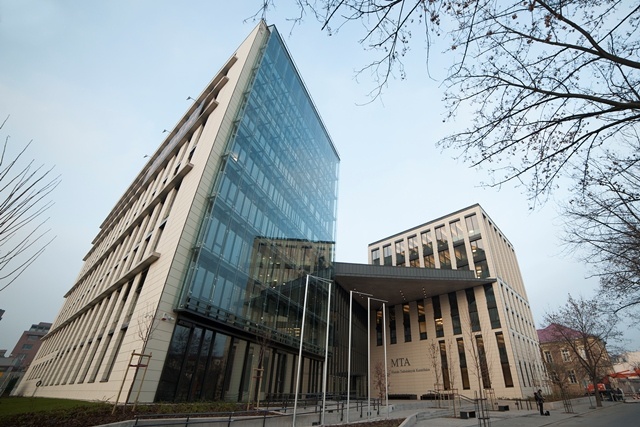 New Research Centre for Human Sciences Source: mta.hu/ Tamás Szigeti
New Research Centre for Human Sciences Source: mta.hu/ Tamás Szigeti Last year was outstandingly successful when it comes to support won by our researchers.
The leaders of the Academy evaluated the results of 2016. President László Lovász stated, that in regards to support won by researchers, last year was outstandingly successful. The ERC support of 1.5-3 million euros for each researcher is a measure of excellence in research all around the world. Last year nine Hungarian scientists won ERC calls for proposals, seven of whom work in the academic research network, while six were former winners of the MTA ‘Momentum’ Program.
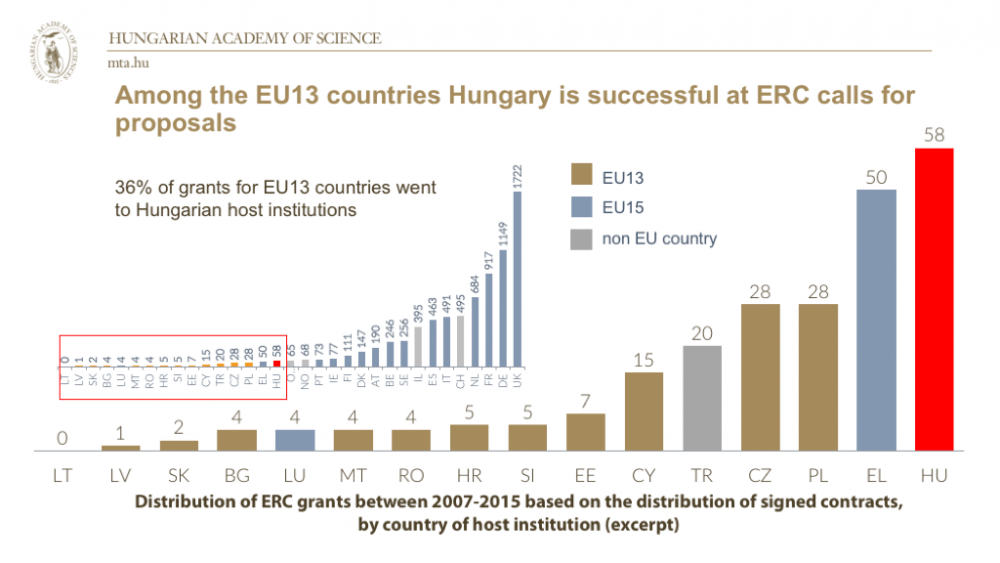
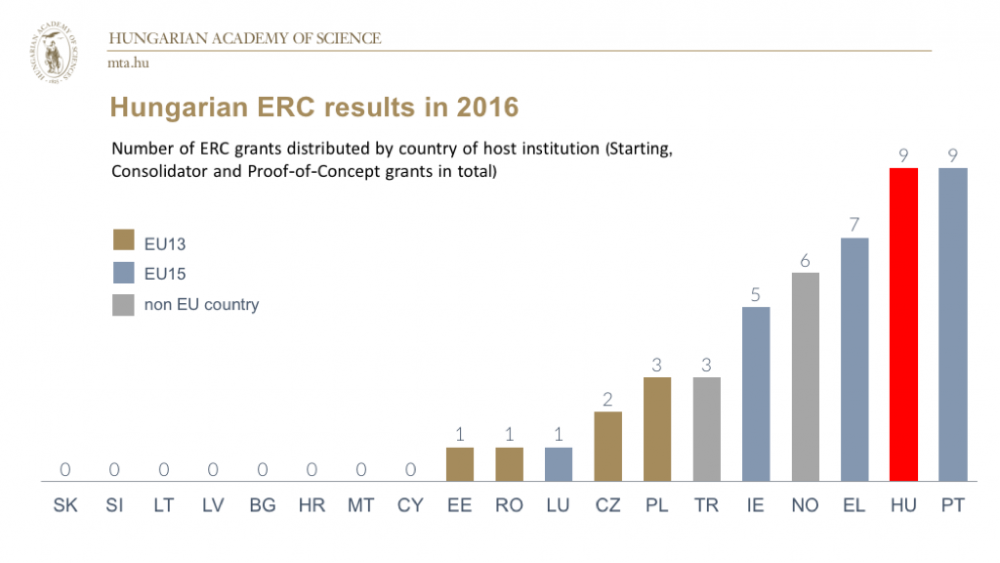 Compared to other countries of the region, Hungary is still outstandingly successful at ERC grants. Moreover, compared to the ‘old’ member states (EU-15), last year Hungary was more successful than Greece (EL) and won the same number of grants as Portugal (PT).
Compared to other countries of the region, Hungary is still outstandingly successful at ERC grants. Moreover, compared to the ‘old’ member states (EU-15), last year Hungary was more successful than Greece (EL) and won the same number of grants as Portugal (PT). 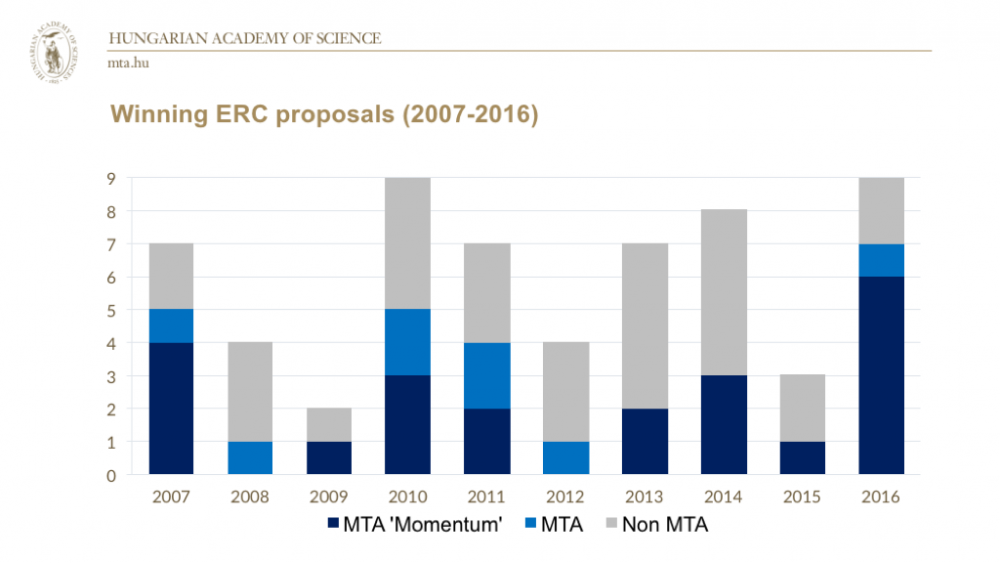 Among the winners of any ERC grant a high number of academic researchers and winners of the Momentum Program can be found. Last year, ‘Momentum’ researchers submitted the majority of winning proposals yet again.
Among the winners of any ERC grant a high number of academic researchers and winners of the Momentum Program can be found. Last year, ‘Momentum’ researchers submitted the majority of winning proposals yet again.Furthermore, regarding grants, 2016 was the most successful year for the research network since the restructuring of 2012. The institutes of the MTA won a total of 262 research grants in 2016, with 217 Hungarian and 45 international grants. Within the ‘Teaming’ action grant, a research co-operation grant with the highest prestige among Horizon 2020 programs, Hungary became the most successful participant: out of the 10 winners, chosen from 169 candidates of 27 countries, 2 consortia feature academic research places (MTA Institute for Computer Science and Control, Budapest, 1600 million HUF, duration: 7 years; MTA Biological Research Centre, Szeged, 680 million HUF, duration: 4 years).
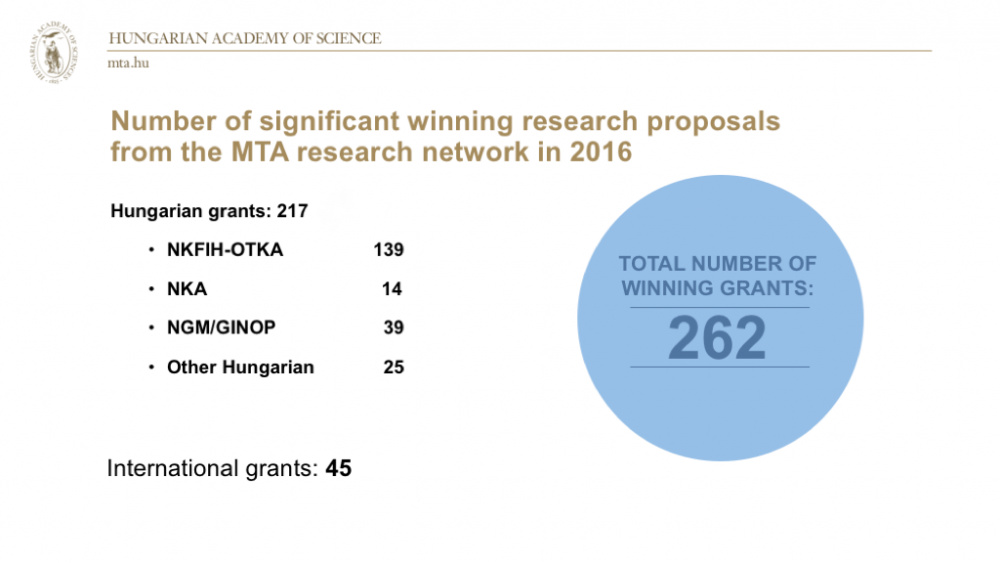
During the press conference held in the new complex, the leaders of the Academy also discussed medium- and long-term plans. During the first two and a half years of László Lovász’s presidency many large scale investments were initiated.
Considering that the out-of-date building of the Institute of Experimental Medicine has become an obstacle to development, a new research building will be built.
The new building is expected to be finished by the end of 2019. The government is providing 3.5 billion HUF for the project.
Another large investment project of the upcoming years is the Agricultural Innovation Centre in Martonvásár, the new research block of the MTA Centre for Agricultural Research (MTA ATK). The centre will accommodate the institutes of the MTA ATK currently operating at different sites, thus the Plant Protection Institute and the Institute for Soil Sciences and Agricultural Chemistry will be moved next to the Agricultural Institute.
The government is providing 6 billion HUF for the project. Another 3 billion HUF will be spent on instruments.
Without so-called large research infrastructures such as optical imaging systems, robotized greenhouses or plant growth chambers, agricultural research on an international level which could provide solutions in tackling the challenges of climate change cannot be carried out. Additionally, an 800 million HUF visitor’s centre will also be erected in Matonvásár where agricultural research will be exhibited.
In 2017 the MTA will continue its strategic research program announced at its 187th General Assembly last year. Up until 2020, a total of 32 course-pedagogy research teams will be working on developing evidence-based education. The essence of the procedure is that, just like in medicine, researchers thoroughly analyze the processes of teaching and learning, and propose only changes that can scientifically be proven to ensure the desired results at schools.
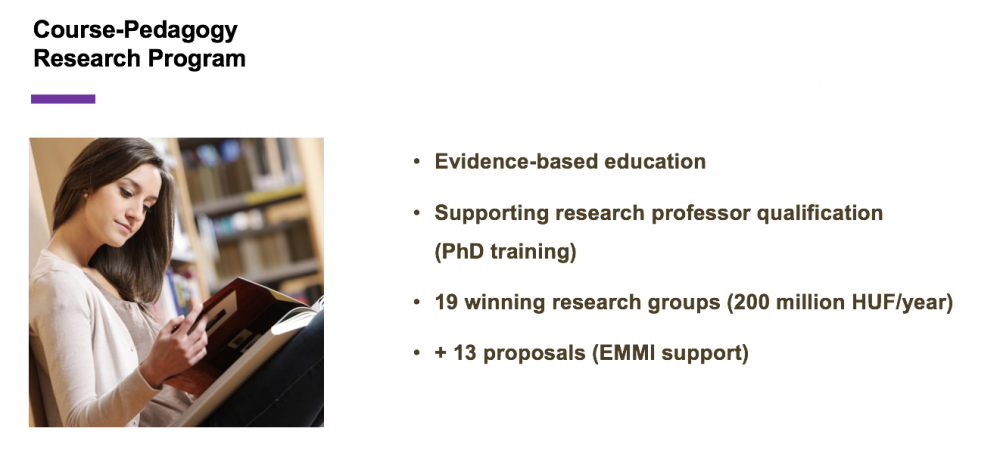
The purpose of the National Water Research Program is to amalgamate engineers, biologists, ecologists, lawyers and economists who are experts in water science into one research network. The program, which is an integral component of the currently developing National Water Strategy (Jenő Kvassay Plan), will be worked out by the newly-formed Water Science Coordination Group, within the framework of the MTA Centre for Ecological Research (MTA ÖK). They are currently working on finalizing an English-language review with an interdisciplinary approach. The study offers an overall picture of the present state of Hungary regarding water issues. After its completion the Academy will join the international water science researches of the Joint Research Centre (JRC) which is in the hands of the European Commission.
